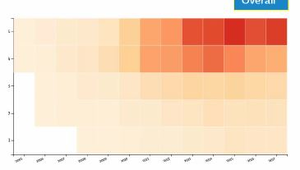Information
- Publication Type: Master Thesis
- Workgroup(s)/Project(s):
- Date: May 2020
- Date (Start): June 2019
- Date (End): 4. May 2020
- TU Wien Library:
- Second Supervisor: Manuela Waldner
- Diploma Examination: June 2020
- Open Access: yes
- First Supervisor: Eduard Gröller
- Pages: 106
- Keywords: Information Visualization, Business Intelligence, Social Network Analysis
Abstract
This thesis explores textual review data and how it changes over time. The thesisis motivated by the constantly generated textual reviews. Review sites like Yelp andTripAdvisor are generating hundreds of thousands of reviews monthly. Analysing thisamount of data is impossible by simply reading every individual review. We look forways to answer questions that business analysts, business owners, and investors ask aboutcustomer review data. This thesis asks questions such as: Why do review scores andtopics change over time? What are the major topics people discuss? What are the typicalreasons why review scores suddenly increase or decrease? What are topics that invokepermanent or transient changes in a large collection of review scores?We created a tool called Review Watcher, which provides novel approaches to examineand analyse review changes over time. The tool aims to provide simple, easily accessibleinformation regarding temporal changes in a collection of restaurant reviews. The tooluses real data provided by Yelp. It employs graphical ways to indicate changes in reviewscores over different periods of time. The tool analyses the review scores over time, andit tries to explain changes in these scores based on the textual content of the reviews.The tool utilises automated text processing algorithms to highlight important and oftenused words in text corpora.We used a qualitative evaluation to determine how well the tool manages to answer theresearch questions. We completed a user study with experts in the field of economics.They shared the insights they gathered using Review Watcher and compared them totheir experiences working with other tools for customer satisfaction and review analysis.As a result of our research, we show that Review Watcher manages to provide betterinsight into what are major topics in a collection of textual reviews. In the thesis, we showthat Review Watcher is better suited to highlighting review changes occurring over timeand giving insights to why the changes occurred, compared to existing tools for reviewexploration. The tool is also proving capable of handling millions of textual reviews oftens of thousands of restaurants with acceptable loading times for the user. The userstudy also reveals some of the tool’s limitations and potential for future work, for examplein introducing improved categorisation functions and geographical information about restaurants.Additional Files and Images
Weblinks
BibTeX
@mastersthesis{Panayotov,
title = " A Visual Exploration Tool forTemporal Analysis of
CustomerReviews",
author = "Blagoy Panayotov",
year = "2020",
abstract = "This thesis explores textual review data and how it changes
over time. The thesisis motivated by the constantly
generated textual reviews. Review sites like Yelp
andTripAdvisor are generating hundreds of thousands of
reviews monthly. Analysing thisamount of data is impossible
by simply reading every individual review. We look forways
to answer questions that business analysts, business owners,
and investors ask aboutcustomer review data. This thesis
asks questions such as: Why do review scores andtopics
change over time? What are the major topics people discuss?
What are the typicalreasons why review scores suddenly
increase or decrease? What are topics that invokepermanent
or transient changes in a large collection of review
scores?We created a tool called Review Watcher, which
provides novel approaches to examineand analyse review
changes over time. The tool aims to provide simple, easily
accessibleinformation regarding temporal changes in a
collection of restaurant reviews. The tooluses real data
provided by Yelp. It employs graphical ways to indicate
changes in reviewscores over different periods of time. The
tool analyses the review scores over time, andit tries to
explain changes in these scores based on the textual content
of the reviews.The tool utilises automated text processing
algorithms to highlight important and oftenused words in
text corpora.We used a qualitative evaluation to determine
how well the tool manages to answer theresearch questions.
We completed a user study with experts in the field of
economics.They shared the insights they gathered using
Review Watcher and compared them totheir experiences working
with other tools for customer satisfaction and review
analysis.As a result of our research, we show that Review
Watcher manages to provide betterinsight into what are major
topics in a collection of textual reviews. In the thesis, we
showthat Review Watcher is better suited to highlighting
review changes occurring over timeand giving insights to why
the changes occurred, compared to existing tools for
reviewexploration. The tool is also proving capable of
handling millions of textual reviews oftens of thousands of
restaurants with acceptable loading times for the user. The
userstudy also reveals some of the tool’s limitations and
potential for future work, for examplein introducing
improved categorisation functions and geographical
information about restaurants.",
month = may,
pages = "106",
address = "Favoritenstrasse 9-11/E193-02, A-1040 Vienna, Austria",
school = "Research Unit of Computer Graphics, Institute of Visual
Computing and Human-Centered Technology, Faculty of
Informatics, TU Wien",
keywords = "Information Visualization, Business Intelligence, Social
Network Analysis",
URL = "https://www.cg.tuwien.ac.at/research/publications/2020/Panayotov/",
}

 image
image Master Thesis
Master Thesis Poster
Poster


